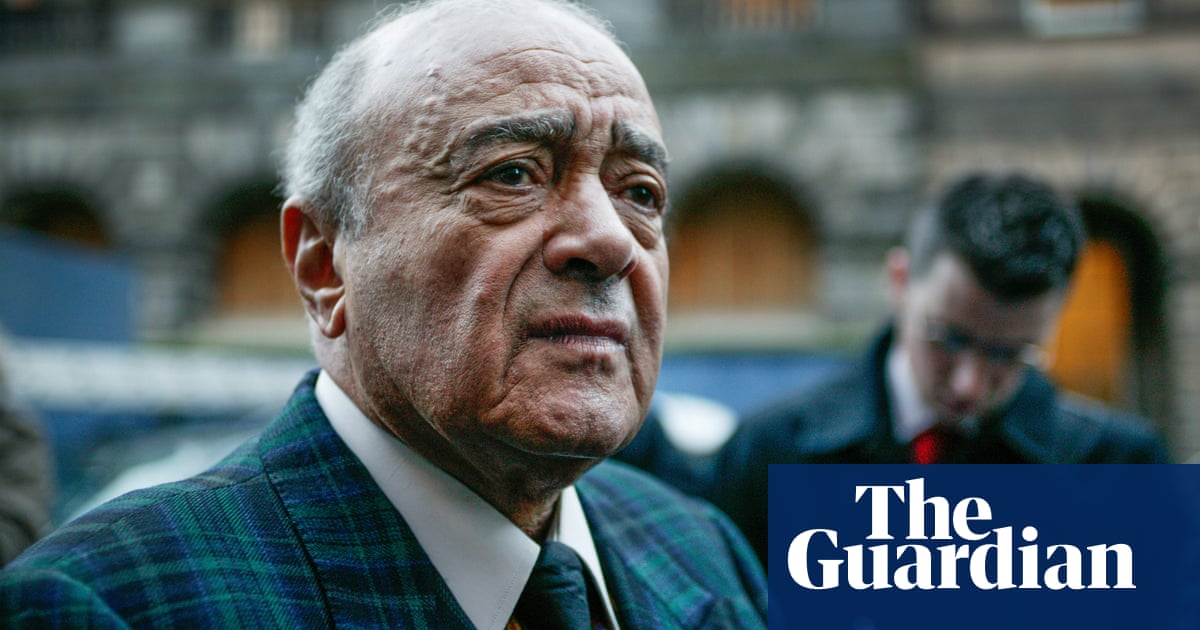Police believe Mohamed Al Fayed may have raped and abused more than 111 women over nearly four decades, with his youngest victim said to have been just 13 years old.
The scale of the criminality would make Fayed, who died last year at the age of 94, one of Britain’s most notorious sex offenders, and raises urgent questions about how he got away with his crimes.
Five unnamed individuals suspected of facilitating Fayed, the former owner of the luxury Knightsbridge store Harrods, are being investigated as potential “facilitators”, Scotland Yard said.
A huge review is also being undertaken into whether opportunities were missed in past police investigations and whether there are grounds to pursue past or current officers over historical corruption claims.
Last month, the Guardian reported claims that corrupt police officers had helped Fayed in persecuting members of his staff, including a young woman who allegedly rebuffed the Harrods owner’s sexual advances.
The 111 alleged cases of abuse involving Fayed include 21 alleged victims who reported crimes to the police between 2005 and his death, and 90 women who have come forward since the BBC aired a documentary on Fayed in September.
The Guardian understands that as soon as next week the Met will find out if it faces an independent investigation into whether it bungled the claims of sexual violence against the Harrods boss.
The police watchdog, the Independent Office for Police Conduct, is considering whether its own investigators should investigate Britain’s biggest force.
A Met spokesperson said: “Following complaints from two women about the quality of investigations conducted in 2008, the Met has voluntarily referred these cases to the Independent Office for Police Conduct.
“While these cases date back over a decade and we cannot change what happened in the past, we are committed to understanding, being open about any shortcomings and improving our response to survivors moving forward.”
Cmdr Stephen Clayman, of the Met’s Specialist Crime Command, said he recognised that trust in the police may have been eroded by its past conduct but called for any other survivors to come forward.
He said: “I recognise the bravery of every victim-survivor who has come forward to share their experiences, often after years of silence.
“This investigation is about giving survivors a voice, despite the fact that Mohamed Al Fayed is no longer alive to face prosecution. However, we are now pursuing any individuals suspected to have been complicit in his offending, and we are committed to seeking justice.
“We are aware that past events may have impacted the public’s trust and confidence in our approach, and we are determined to rebuild that trust by addressing these allegations with integrity and thoroughness.
“We encourage anyone who has information or was affected by Al Fayed’s actions to reach out to us. Your voice matters, and we are here to listen and to help.”
The crimes of which Fayed is accused span between 1977 and 2014. The Met said they had already reviewed more than 50,000 pages of evidence, including victim and impact statements, and retrieved “significant amounts of material from these investigations” stored in their archives.
As part of the inquiry, detectives from the Directorate of Professional Standards are seeking to establish if any serving or former officers at the Met were involved in any misconduct.
Detectives have been examining a witness statement from a former security director at the Knightsbridge store, Bob Loftus, who had claimed that one ex-Met commander received luxury hampers “whenever he had been a particularly great help to Harrods”.
Loftus had further claimed that a detective constable, who was accused of regularly taking cash bribes to carry out Fayed’s wishes, was secretly given a mobile phone from Harrods to facilitate his illicit work.
“It’s amazing what they will do for just a few readies,” John Macnamara, Fayed’s longtime security chief and an ex-detective, was said to have remarked about the police.
Loftus, 83, who worked for Fayed as the director of security at Harrods between 1987 and 1996, was unable to comment due to ill health when approached by the Guardian, but Eamon Coyle, 70, who was Loftus’s deputy, said he recognised the allegations contained in the statement to be true.
Coyle said: “I knew that there was a tame policeman. He was under the direct control of Macnamara. He was on tap. He was on the payroll.”
It is understood that detectives have interviewed a number of potential witnesses as part of the investigation into potential misconduct.
A Met spokesperson said: “The Metropolitan police is committed to thoroughly reviewing all information relating to historical allegations in the case of Mohamed Al Fayed, which includes our Directorate of Professional Standards assessing any indication of police misconduct.
“In line with this, we always look to acquire relevant documents, including witness statements, and other materials which we will actively review.”



